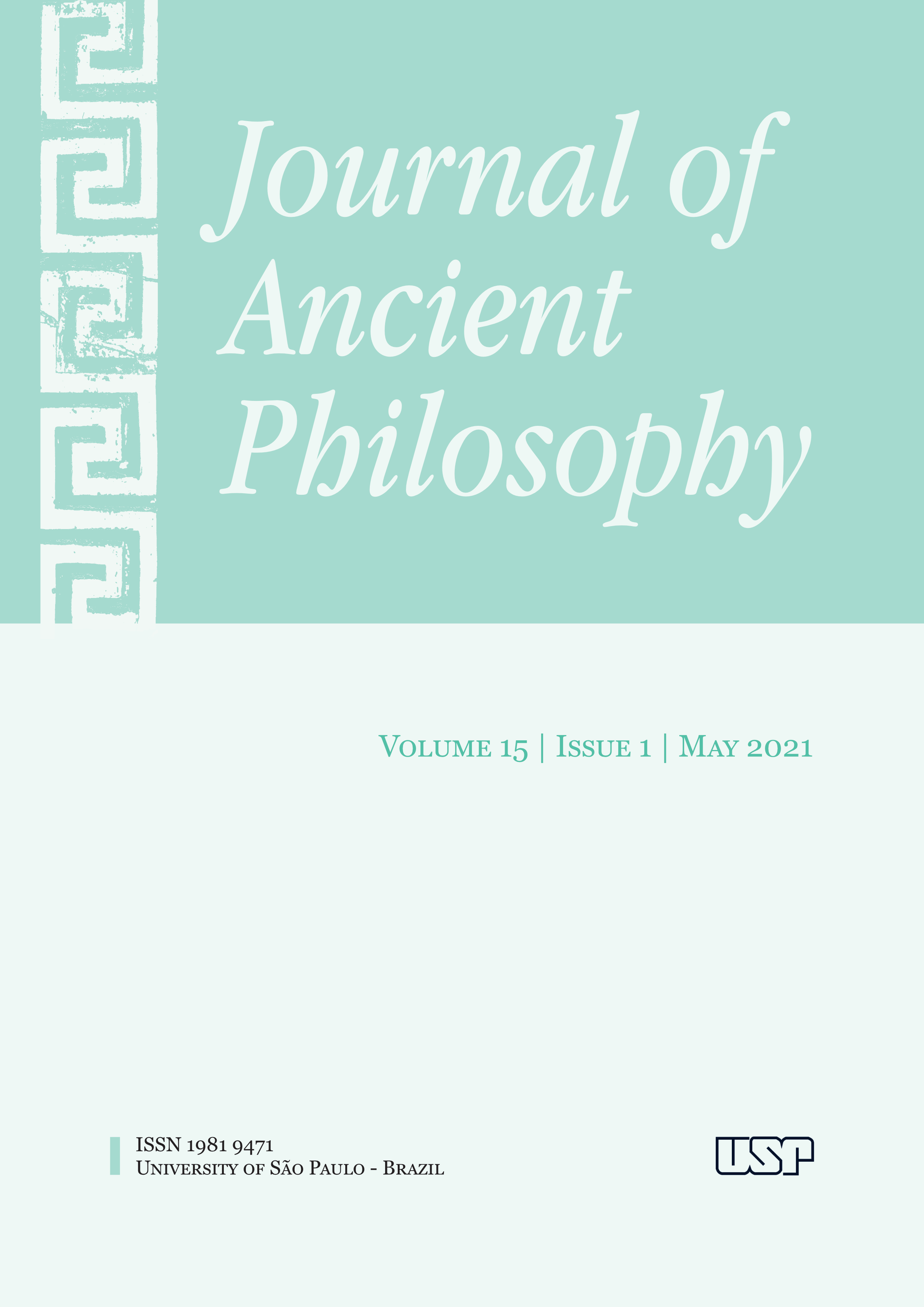Equimodalidade e Hôs Epi To Poly no De Interpretatione 9
DOI:
https://doi.org/10.11606/issn.1981-9471.v15i1p144-172Keywords:
De interpretatione , Batalha naval, EquimodalidadeAbstract
In the first part of De Interpretatione 9, Aristotle introduces an argument for fatalism that he obviously does not subscribe to. Readers of the chapter wonder how Aristotle replies to that argument. In this paper I claim that the main basis of his reply is the principle of equimodality stated in 19a33 (“statements are true in the same way as the actual things are”). I defend that this principle should be interpreted in the most straightforward way, as saying that the modality with which any statement is true is the same as the modality with which the actual things referred to in the statement are what they are. This entails that something is (or will be) necessarily such and such only if the statement saying that it is (or will be) such and such is necessarily true. By applying this principle to Aristotle’s distinction between two kinds of non-necessary things – those that happen as chance has it and those that happen for the most part (hôs epi to poly) in one way rather than another –, one should conclude that, because these things are contingent, statements about them can only be contingently true.
Downloads
References
Anscombe, G. E. M. 1956. “Aristotle and the Sea Battle”, Mind 65, pp. 1-15.
Bäck, Allan. 1992. “Sailing through the Sea Battle”, Ancient Philosophy 12, pp. 133-151.
Byrd, Jeremy. 2010. “The Necessity of Tomorrow’s Sea Battle”, The Southern Journal of Philosophy 48, pp. 160-176.
Crivelli, Paolo. 2004. Aristotle on Truth. Cambridge: Cambridge University Press.
Fine, Gail. 1984. “Truth and Necessity in De Interpretatione 9”, History of Philosophy Quarterly 1, pp. 23-47.
Frede, Dorothea. 1985. “The Sea-Battle Reconsidered: a Defence of the Traditional Interpretation”, Oxford Studies in Ancient Philosophy 3, pp. 31-87.
Gaskin, Ricard. 1995. The Sea Battle and the Master Argument. Berlin: Walter de Gruyter.
Hintikka, Jaakko. 1973. Time and Necessity. Oxford: Clarendon Press.
Jones, Russell E. 201o. “Truth and Contradiction in Aristotle’s De Interpretatione 6-9”, Phronesis 55, pp. 26-67.
Judson, Lindsay. 1988. “La Bataille Navale d’Aujourd’hui: De Interpretatione 9”, Revue de Philosophie Ancienne 6, pp. 5-37.
Judson, Lindsay. 1991. “Chance and ‘Always or For the Most Part’ in Aristotle”, in L. Judson (ed.), Aristotle’s Physics. Oxford: Clarendon Press, pp. 73-99.
Łukasiewicz, Jan. 1970. “On Determinism”, in L. Borkowski (ed.), Jan Łukasiewicz: Selected Works. Amsterdam: North-Holland Publishing Company, pp. 110-128.
Mignucci, Mario. 1981. “Hôs epi to poly et Nécessaire dans la Conception Aristotélicienne de la Science”, in E. Berti (ed.), Aristotle on Science: the Posterior Analytics. Padova: Antenore, pp. 173-203.
Santos, Ricardo. 2016. Aristóteles: Categorias e Da Interpretação. Lisboa: Imprensa Nacional – Casa da Moeda.
Striker, Gisela. 2009. Aristotle: Prior Analytics, Book I. Oxford: Clarendon Press.
van Inwagen, Peter. 1983. An Essay on Free Will. Oxford: Clarendon Press.
van Rijen, Jeroen. 1989. Aspects of Aristotle’s Logic of Modalities. Dordrecht: Kluwer Academic Publishers.
Whitaker, C. W. A. 1996. Aristotle’s De Interpretatione. Oxford: Clarendon Press.
Downloads
Published
Issue
Section
License

This work is licensed under a Creative Commons Attribution 4.0 International License.
Copyright
Authors who publish with this journal agree to the following terms:
- Authors retain copyright and grant the journal right of first publication with the work simultaneously licensed under a Creative Commons Attribution License (CC By 4.0) that allows others to share the work with an acknowledgement of the work's authorship and initial publication in this journal.
- Authors are able to enter into separate, additional contractual arrangements for the non-exclusive distribution of the journal's published version of the work (e.g., post it to an institutional repository or publish it in a book), with an acknowledgement of its initial publication in this journal.
- Authors are permitted and encouraged to post their work online (e.g., in institutional repositories or on their website) prior to and during the submission process, as it can lead to productive exchanges, as well as earlier and greater citation of published work (See The Effect of Open Access).


